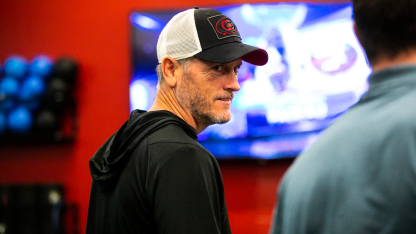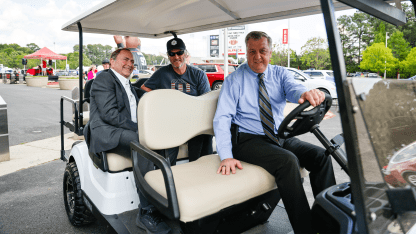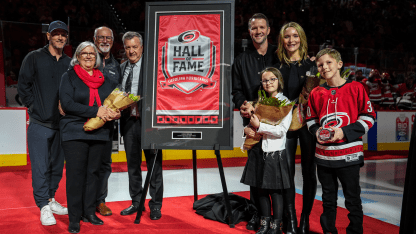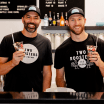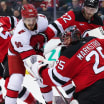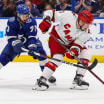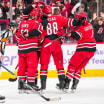Scott Burnside: When you think back five years and you first came in here, and maybe you first came in this locker room, what's it like to come in on a night like tonight, Cam's night, and with what will happen on Saturday?
Tom Dundon: So, the first time I walked in, it was pre-season before I bought the team. There was nobody here. And there weren't 2,500 people in the building I don't think. And this is where the coaches' office was. It was a tiny little closet. And I walked in, and I'll never forget, Rod turned to look at me. He's got this big, grizzled face. And the locker room was terrible, I couldn't believe that this was a professional sports team. So, yeah, my first impression was, what the? What's going on here?
Burnside: Even then in your looking around are you already thinking of the possibilities? Can you see what you might want to start to do even at that point?
Dundon: I have a way I like to do things and it wasn't like I walked in that day and said that I knew what to do. I just knew that there was a process that you could go through that I think could lead to success. It didn't ever cross my mind that we wouldn't be able to fix it, whatever that means, that we would have the confidence that we would be good. How good? That's harder to know. But I knew we could do better and that we would be really good. I never doubted that.
Burnside: Is it because you believed in the process and believed in the people that you wanted, whether it was Don or Rod or whoever it was that you envisioned being part of this 'team' not just the players, but the team, that made you optimistic?
Dundon: I think there's a set of decisions you make and you make them consistently every day. You push hard every day and that should lead to success in most cases. So, yeah, that seemed like a certain outcome. The outcome that was uncertain was if we started winning, how high up could you get? I'm not saying I thought we would have, I think we've got one of the better records the last five years, whether winning and winning as much as we've done, those are two different things. And the third thing is whether you ultimately end the year as the winner, that's less controllable. But I knew the things we could control we would do really well, or I thought we would.
Burnside: Have there been things that have surprised you about owning this team? Things that you didn't know or maybe things that you've learned through the five years?
Dundon: I thought that the coach would be more connected to the culture, and I think that's true, but I think it's probably even more important than I realized. So I think the part that I probably learned is if we hadn't done that, (hired Brind'Amour), I think that variable had a bigger impact, and it was more important than I probably would have known at the time. I always thought it was important. I think part of the upside from my expectations was probably because I was very fortunate there (with the Brind'Amour hire).
Burnside: But you identified what Rod would bring to the process.
Dundon: Sort of. He was here, though. I mean didn't go searching for him. He was here.
Burnside: When you think about the things that have been accomplished and the winning, does it affect you differently than you thought it was going to? I mean you're involved in the draft and trade deadline and things like that, has it been different than you imagined it, the highs and the lows?
Dundon: The problem for me, and I think Rod is the same way, is the losing. Even winning and not, like even after [Tuesday night vs. Washington] it wasn't what you like to see, even though you won. So the way that impacts me, I don't know if it's surprising, but I would hope that over time it gets where you can put it more in perspective and I just can't.
Burnside: Do you have trouble sleeping (after losses)? Does it stay with you?
Dundon: Oh yeah, it stays with me for sure. I hate it. This is supposed to be fun. But it's only fun when you win and play great. And no one gets hurt. And then you start thinking about, well how do we keep this? The hardest part now is keeping it at this level. It's difficult. But you want to keep it.

